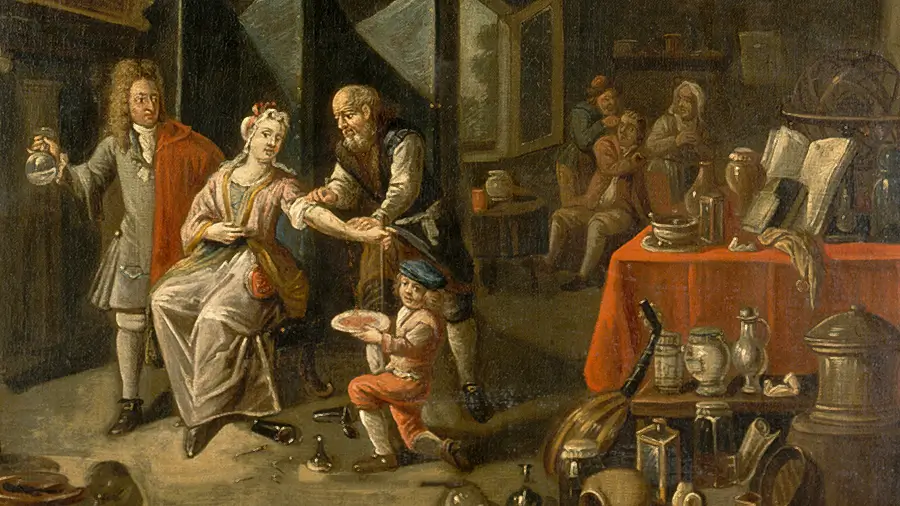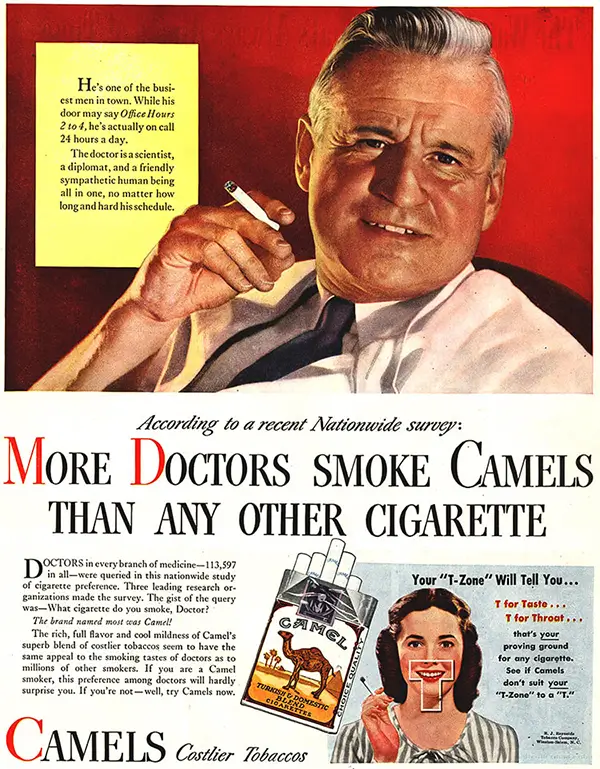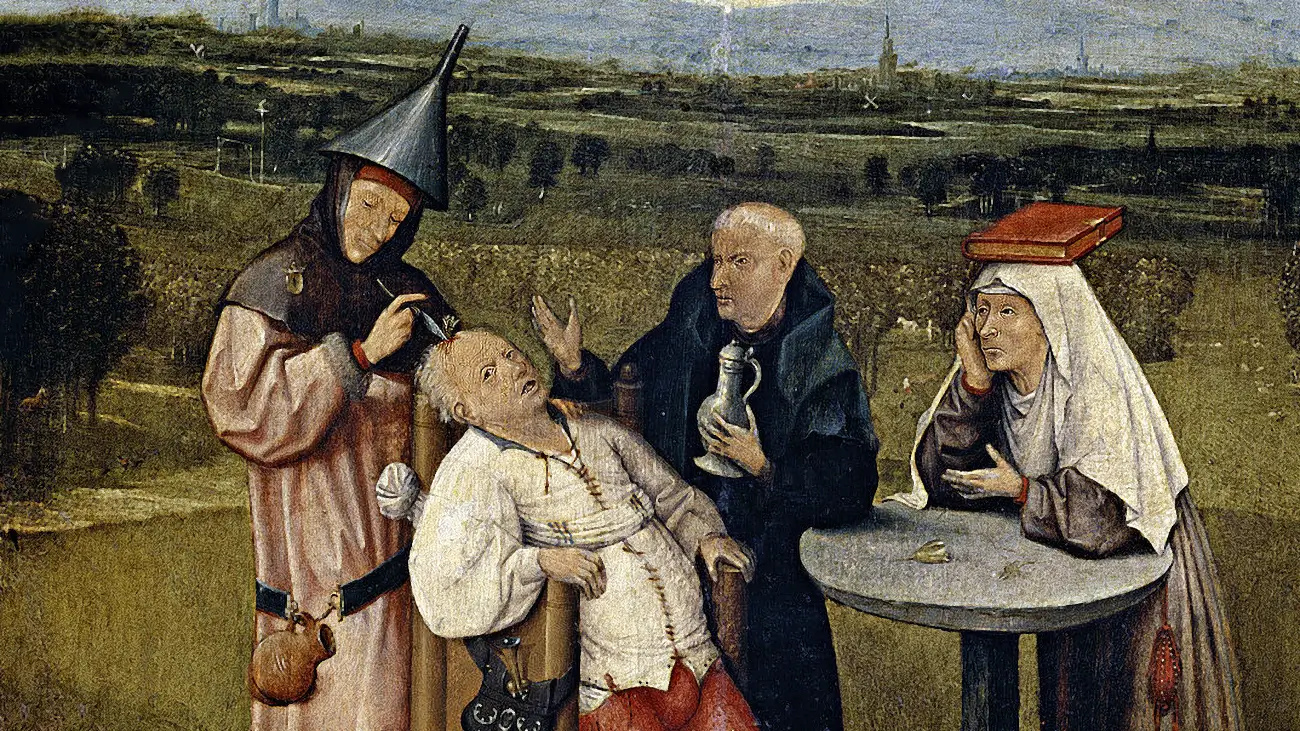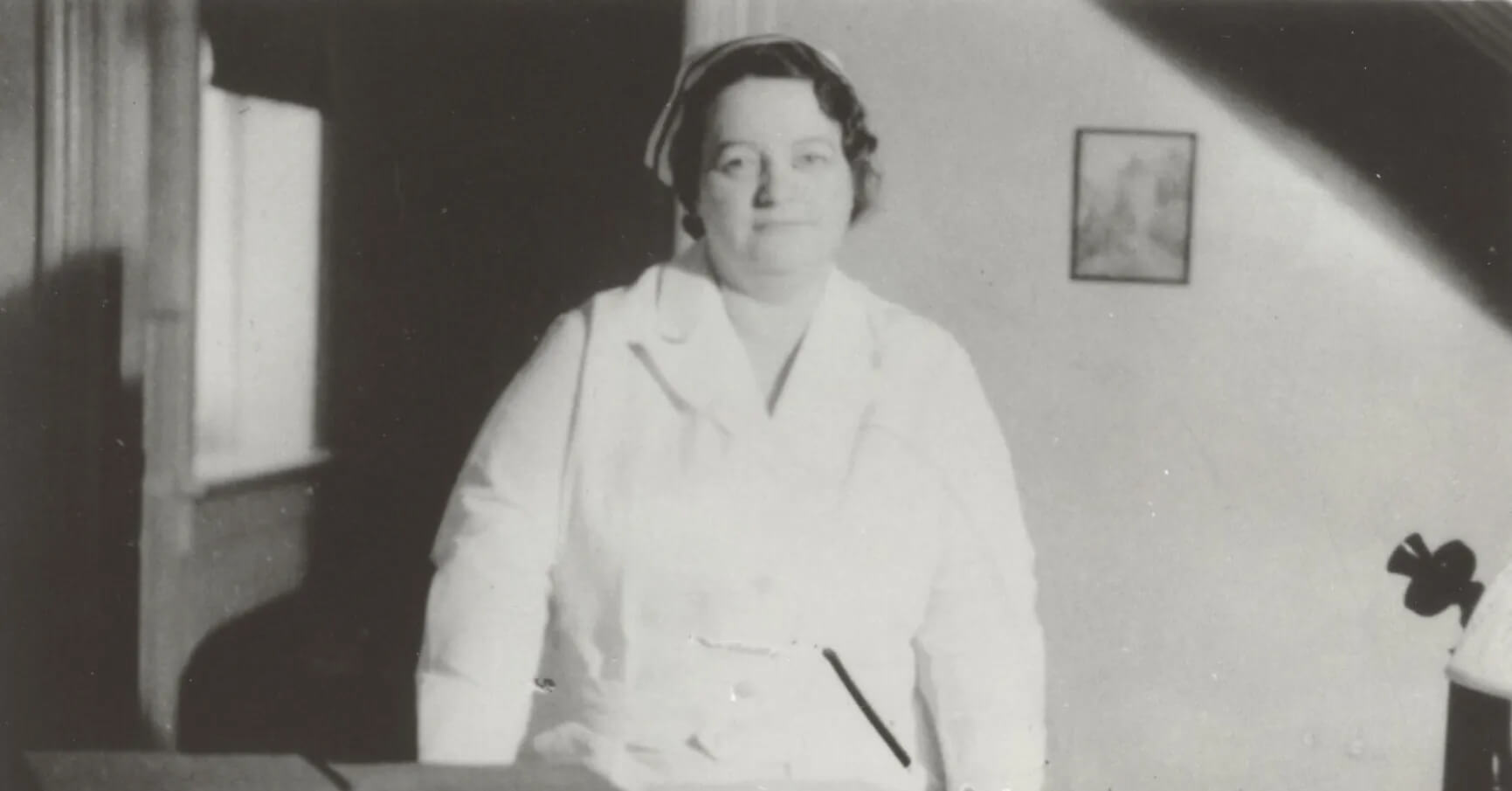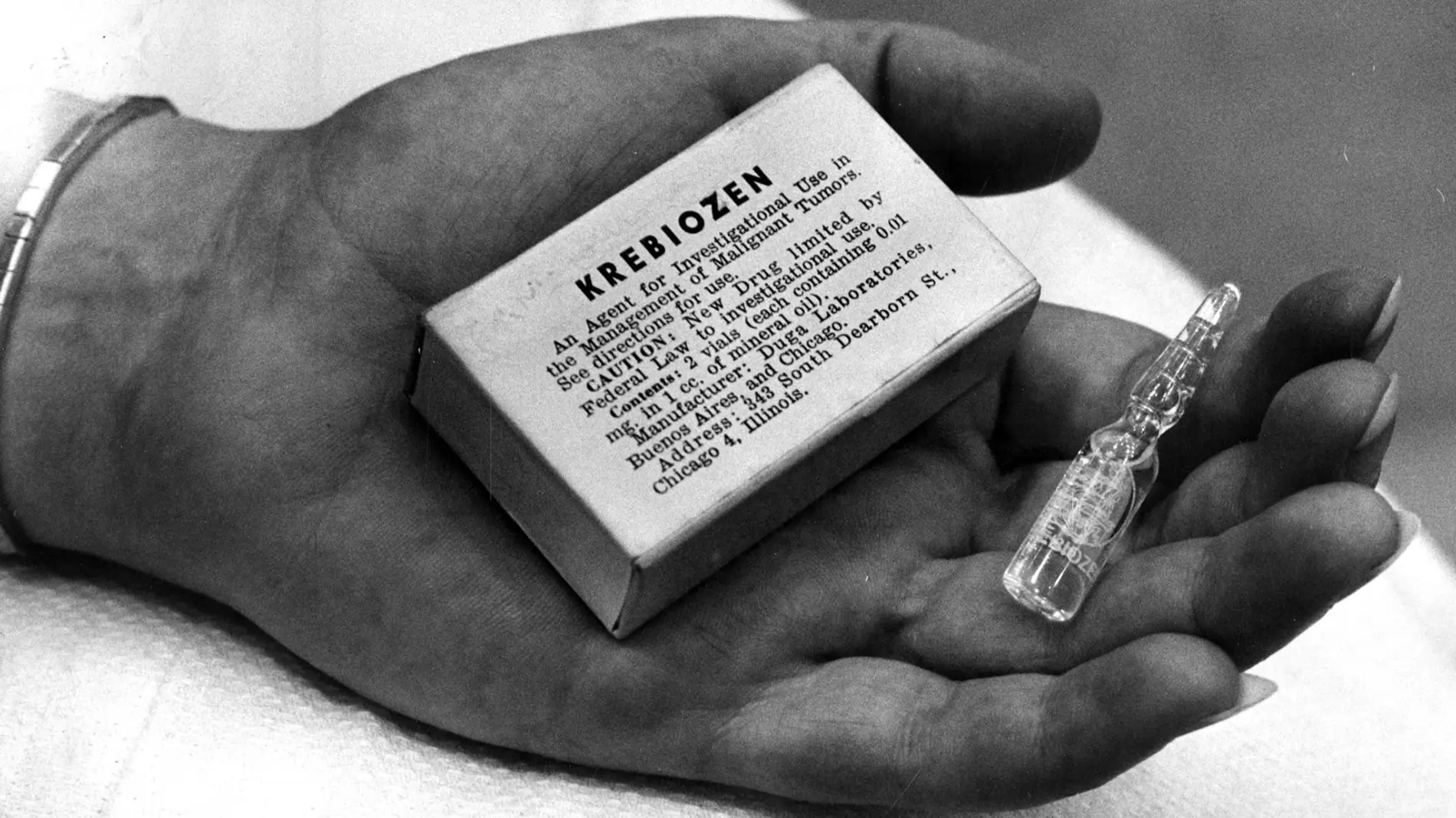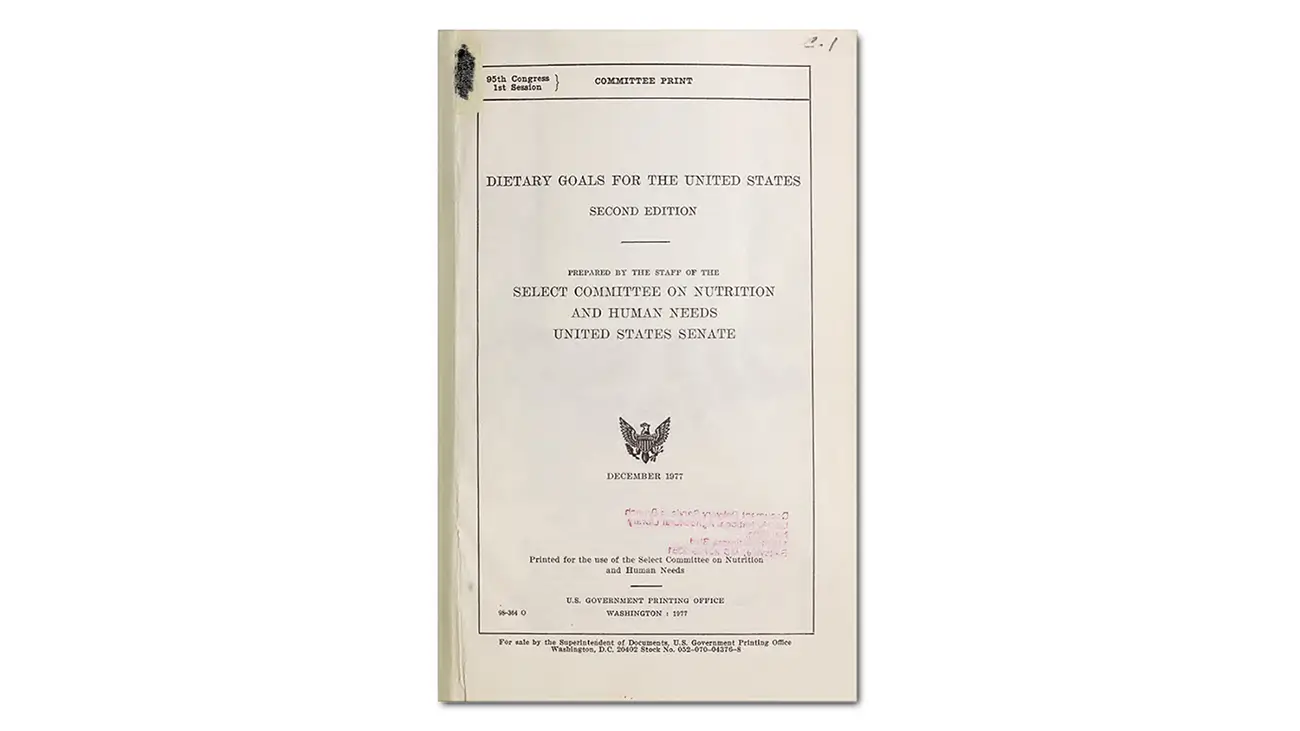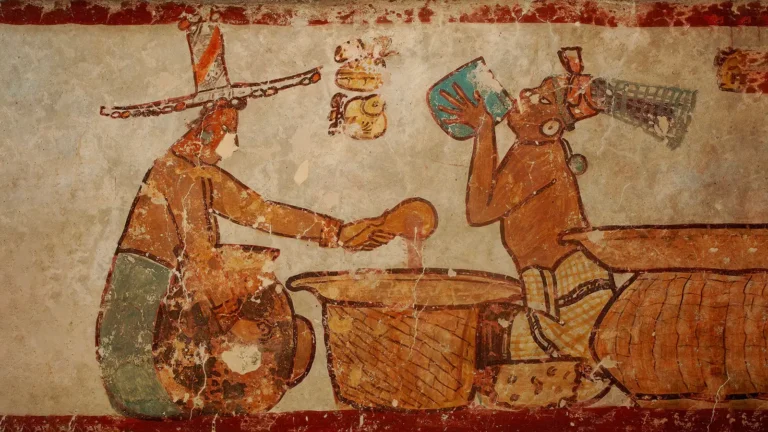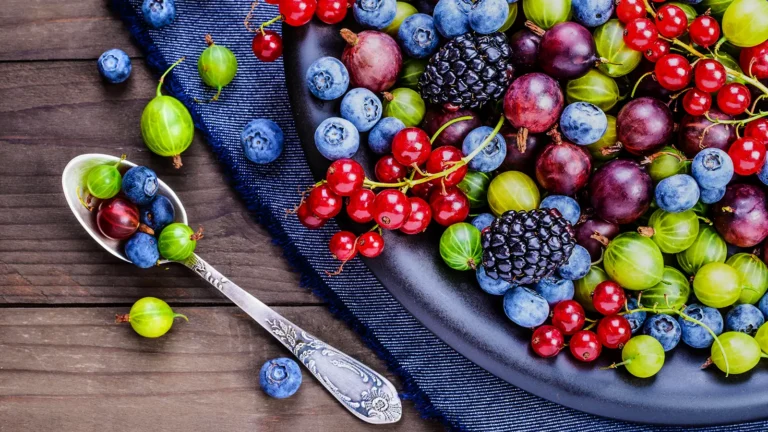La Medicina alopática - El Surgimiento de una Industria
El saldo de las secciones médicas se mantuvo igual a la vuelta del siglo 20, cuando los nuevos tratamientos médicos se supo que eran potencialmente muy rentable.
Milos Pokimica
Escrito por: Milos Pokimica
Revisado Médicamente Por: Dr. Xiùying Wáng, M.D.
Actualizado el 9 de junio de 2023Hace unos 100 años, la medicina alopática moderna pudo finalmente neutralizar a los llamados médicos empíricos u holísticos o curanderos naturales. Se les llamaba empíricos porque utilizaban únicamente la observación empírica sin ninguna forma de ciencia. Los conocimientos se transmitían de generación en generación en forma de hierbas naturales y otras formas de medicina popular. En el siglo XIX la sociedad estaba dividida entre dos formas de medicina y existía la regulación de ambas formas con leyes y restricciones por igual. Los pacientes podían elegir entre ambas formas de tratamiento, los alópatas y los empíricos. Los médicos alópatas (modernos) llamaban a su enfoque medicina heroica y creían en el uso de venenos para tratar agresivamente las enfermedades. Llamaban a su práctica teoría científica. Utilizaban tres técnicas principales.
- Sangraron el cuerpo para drenar las toxinas malas como en la edad media. Durante la peste de la Edad Media, la práctica terapéutica consistía en cortar las venas que conducían al corazón. Esto, en su mente, permitiría que la enfermedad abandonara el cuerpo. Las hinchazones asociadas a la peste negra también se cortaban para permitir que la enfermedad saliera. Se siguió utilizando esta práctica.
- Luego administran enormes dosis de metales pesados tóxicos como el mercurio que conducen a desplazar la enfermedad original.
- También utilizaban la cirugía, que era el mejor método de todos. Estudiaban científicamente la anatomía humana y creían en el mismo principio de tratar agresivamente las enfermedades extirpándolas.
Los médicos empíricos creían en el potencial de autocuración del cuerpo humano natural y no recurrían a ninguna forma de cirugía. Ni siquiera permitían perforar la piel humana de ninguna forma. Así que nunca practicaron la cirugía. En aquella época era un método brutal sin anestesia ni control de infecciones. Incluso los dientes en mal estado eran procedimientos de extirpación dolorosos y mortales sin antibióticos. Los alópatas también hacían esa cirugía. En aquella época, la mayoría de los pacientes temían por completo los métodos alopáticos y, en no pocas ocasiones, los pacientes morían a causa de la curación. Los curanderos empíricos, al contrario que los médicos, creían en estimular las defensas del cuerpo para que se curara a sí mismo. También utilizaban productos vegetales, hierbas y sustancias no tóxicas en pequeñas cantidades. Por lo general, si el tratamiento no tenía éxito, no agravaban el estado de la enfermedad, y si el paciente moría, lo hacía a causa de la propia enfermedad y no de la cura, como el mercurio o las hemorragias.
El equilibrio y la coexistencia de ambas ramas médicas se mantuvo igual hasta que, hacia el cambio de siglo, surgieron nuevos tratamientos médicos potencialmente muy rentables.
A la Asociación Médica Americana se unieron y se vieron influidas por fuertes fuerzas financieras y de control y transformaron la medicina en una industria. Los carteles bancarios internacionales o en nombres personales Rockefeller, Morgan y Carnegie financiaron la cirugía, la radiación y las drogas sintéticas. Carnegie vendió posteriormente todos sus negocios a Morgan y se convirtió en filántropo. Rockefeller y Morgan fueron algunos de los fundadores y accionistas de la Reserva Federal (un banco privado que aún controla en gran medida la economía estadounidense y mundial) y también fueron monopolistas de la industria pesada y la industria petrolera. Se convertirían en los cimientos empresariales de la nueva industria médica.
Una toma de control de las escuelas de medicina permitió una toma de control de toda la industria médica. Carnegie, en particular, entró en escena y dijo que pondría las finanzas. Invirtieron enormes cantidades de dinero en la fundación de la nueva industria, en particular en las escuelas que eran complacientes en cooperar con ellos. Por el dinero, que gastaron tenían una solicitud para poner algunas de sus personas en un consejo de administración para ver que su dinero se gasta sabiamente. Lo que sucede es que todas las grandes universidades recibieron grandes subvenciones de estas personas y también aceptaron a una o más de estas personas en el consejo de administración. Ahora bien, no estaban allí para difundir la ciencia y el aprendizaje en pos del bienestar social y la felicidad humana. Fueron puestas allí como un esquema mayor de planes para asegurar el interés de los banqueros. Casi de la noche a la mañana las escuelas fueron tomadas. Las escuelas recibieron grandes cantidades de dinero, y lo gastaron en nuevos y costosos equipos y construyeron nuevos edificios y nuevos laboratorios, y contrataron a más investigadores y profesores. Sin embargo, al mismo tiempo, vendieron sus intereses a la creciente industria llamada medicina, dominada por las recién fundadas empresas farmacéuticas. A partir de ese momento de la historia, a los médicos se les enseñarían medicamentos farmacéuticos y formas alopáticas de medicina intervencionista en beneficio de los intereses financieros privados del cártel bancario internacional dirigido por Rockefellers y Morgan.
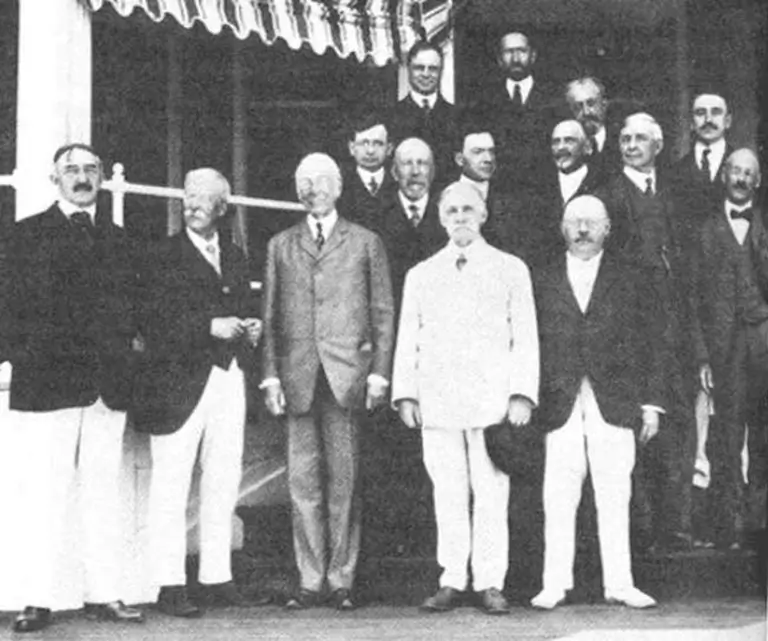
En la foto, se puede ver a los fideicomisarios de la General Educational Board, la primera Fundación Rockefeller, en un retiro en Rockland, Maine, en julio de 1915. Además de Rockefeller, en el centro, también se puede ver, por ejemplo, a Charles W. Eliot (ex presidente de la Universidad de Harvard), Harry Pratt Judson (presidente de la Universidad de Chicago), y muchas otras personas "importantes" que por el mero hecho de reunirse en un lugar así han creado lo que se conoce como un conflicto de intereses.
Es asombroso el poco dinero que se necesitó para hacerlo. Por aquel entonces, la cirugía se convirtió en un aspecto más importante de la medicina alopática debido a la anestesia y al control de las infecciones, y los médicos abogaban cada vez más por el uso y la investigación de operaciones costosas como cura para todas las enfermedades en las que pudiera aplicarse. Entonces se construyó el gran y lucrativo sistema hospitalario y la fiebre del radio arrasó la medicina. El precio del radio subió un 1000% de la noche a la mañana. La industria farmacéutica creció a partir del auge de la medicina patentada. Los colegios cambiaron las normas de educación y las regulaciones de licencias para excluir a los empíricos. Sólo los médicos aprobados por la AMA podían ejercer legalmente la medicina. Se lanzó una campaña mediática para sembrar el miedo y asociar a los empíricos con charlatanes y peligro. Desde entonces y hasta hoy las escuelas de medicina representan un interés del cártel bancario y no el interés de los individuos.
Desafortunadamente, la "industria" médica y el gobierno también han sido tomados por intereses especiales y esa es la misma situación hasta el día de hoy. Ans era muy simple. Primero Rockefeller, Morgan y Carnegie se hicieron con el control del sistema de enseñanza. Luego le dieron a la AMA el poder de excluir de la practica a todos los empiricos y doctores que no les gustaban. Luego se apoderaron de todo el proceso de pruebas de medicamentos influyendo fuertemente en la publicación médica que revisa esos medicamentos y tiene el control de los medios de comunicación regulares. Finalmente, extendieron su control sobre la FDA que supuestamente verifica la seguridad y eficacia de esos medicamentos.
El médico medio de hoy en día recibe una gran formación, sabe mucho sobre medicamentos y cirugía, pero no sabe nada sobre nutrición. Y ha aprendido a asociar la nutrición con la charlatanería y a mantener la boca cerrada y seguir las directrices de la industria por miedo a perder su salario de seis cifras. Ha aprendido que lo único que importa es lo que le dice el gran libro del que aprende en la escuela porque eso es ciencia y todo lo demás es maldad. El médico medio tiene la misma mentalidad que alguien que ha sido adoctrinado en un culto religioso. Tiene miedo a la muerte si empieza a pensar fuera de las directrices de la industria literaria.
Existe una alta probabilidad de que pierda su trabajo por intentar ayudar a la gente. Luego perderá su casa y no podrá pagar su préstamo estudiantil. Aunque al final sepa lo que está pasando, aceptará el sistema y lo defenderá. Hará un juramento hipocrático, pero no es un verdadero médico empírico como lo era el propio Hipócrates. Por ejemplo, Hipócrates había prohibido a sus alumnos perforar la piel humana en todas las ocasiones. Los médicos de hoy en día hacen todo lo contrario. Incluso te harán daño conscientemente si eso es lo que les han ordenado. Como mínimo, se mostrarán indiferentes.
Incluso hoy en día, los médicos están en el punto de mira por decir la verdad. Aprenden en la universidad a mantener la boca cerrada. La historia del Dr. John McDougall fue un buen ejemplo (https://www.drmcdougall.com/). Casi le expulsan de la facultad de medicina en un par de ocasiones porque le costaba mantener la boca cerrada. Luego estuvo a punto de ser expulsado de la residencia cuando perdió la calma tras atender a un paciente que sufría su tercer infarto de miocardio. Le dijo al paciente que no tenía un futuro brillante si no cambiaba a una dieta basada en almidón, frutas y verduras. Su jefe de Medicina le llamó para charlar con él y le dijo que había avergonzado a su médico de cabecera hablando de comida y que no volviera a hacerlo si tenía que ocupar algún puesto de trabajo en el futuro. Así que se calló durante un tiempo, y después de conseguir su "billete" el jefe de Medicina de la residencia de la Universidad de Hawaii Dr. Schatz le llamó de nuevo, y le dijo:
"Sabes McDougall, me gustas. Me gustan tu mujer y tus hijos. Creo que tienes una gran familia, pero me temo que te vas a morir de hambre con tus locas ideas sobre una dieta vegetariana. No vas a trabajar en ningún sitio, y los únicos pacientes que vas a tener son un montón de vagos y hippies".
Esta es la misma forma en que funciona cualquier forma de crimen organizado a través de diferentes formas de intimidación hacia su familia. McDougall le dijo que tenía un abdomen grande y gordo pero que tiene que mirarse en el espejo y que no va a tratar las enfermedades crónicas con medicamentos y cirugía. Para la gente que no sabe hoy en día la cirugía a corazón abierto costo es: $324,000. Simplemente no se puede hacer ese tipo de beneficio con la venta de patatas dulces. El problema de McDougall era que se había criado en una familia americana pobre donde los principios más elevados eran la honestidad, así que probablemente no encajaba bien en la industria médica. Afortunadamente, no era tan grande como para convertirse en un objetivo real, así que vivió una vida plena. Más tarde escribió el libro titulado La solución del almidón .
Sólo utilizo su situación como ejemplo del funcionamiento de todo el sistema. La industria persigue sistemáticamente cualquier amenaza imaginable sin excepción. Esto fue en 1978, y a día de hoy la situación es la misma. McDougall incluso es expulsado de la Conferencia de Medicina de la Obesidad en San Francisco en 2016. Se le pidió que hablara en la conferencia, pero la gente de la conferencia médica exigió que todos los oradores presentaran las diapositivas y videos para su aprobación. Inicialmente, pensaron que su enfoque se basaba en la dieta mediterránea, pero cuando se dieron cuenta de que no es la dieta mediterránea que pensaban que era, la carne completa, el alcohol y el queso falsa dieta mediterránea y que en su lugar, era realmente la gente pobre dieta vegana baja en grasa a base de almidón (Dieta mediterránea- "Maravilla" de aceite de oliva). Le desinvitaron con la excusa de que no está dispuesto a ser "políticamente correcto". También consiguió que se aprobara una ley en 2011. Testificó ante el Comité del Senado sobre la necesidad de educar a los estudiantes de medicina en nutrición humana. El proyecto de ley era el SB 380 Educación médica continua. Fue aprobado en el Congreso de California, y fue firmado por el gobernador por lo que se convirtió en la ley en California para obligar a las 11 escuelas de medicina también deben enseñar nutrición a los estudiantes de medicina. Sin embargo, la industria médica no tiene interés en curar a la gente, por lo que la aplicación de la ley fue dada a la Junta Médica de California.
Cumplen la ley publicando un párrafo en su boletín informativo una vez al año sobre nutrición.
Referencias:
Pasajes seleccionados de un libro: Pokimica, Milos. Go Vegan? Examen de Ciencias de la Parte 2. Kindle ed., Amazon, 2018.
Contenidos Relacionados
¿Tienes alguna duda acerca de la nutrición y la salud?
Me encantaría saber de usted y responderlas en mi próxima publicación. Agradezco sus aportes y opiniones y espero tener noticias suyas pronto. También te invito a síguenos en Facebook, Instagram y Pinterest para más contenidos sobre dieta, nutrición y salud. Puedes dejar un comentario allí y conectar con otros entusiastas de la salud, compartir tus consejos y experiencias, y recibir apoyo y ánimo de nuestro equipo y nuestra comunidad.
Espero que este post le haya resultado informativo y ameno y que esté preparado para aplicar los conocimientos adquiridos. Si le ha resultado útil, por favor compártelo con tus amigos y familiares que también podrían beneficiarse de ella. Nunca se sabe quién puede necesitar orientación y apoyo en su camino hacia la salud.
– También Te Puede Interesar –

Aprenda Sobre Nutricion
Milos Pokimica es doctor en medicina natural, nutricionista clínico, escritor sobre salud médica y nutrición y asesor en ciencias de la nutrición. Autor de la serie de libros Go Vegan? Revisión de la Ciencia, también dirige el sitio web sobre salud natural GoVeganWay.com.
Descargo De Responsabilidad Médica
GoVeganWay.com le ofrece reseñas de las últimas investigaciones relacionadas con la nutrición y la salud. La información proporcionada representa la opinión personal del autor y no pretende ni implica sustituir el asesoramiento, diagnóstico o tratamiento médico profesional. La información proporcionada tiene fines informativos únicamente y no pretende sustituir la consulta, el diagnóstico y/o el tratamiento médico de un médico o proveedor de atención médica calificado.NUNCA ignore el CONSEJO MÉDICO PROFESIONAL O RETRASAR la BÚSQUEDA de TRATAMIENTO MÉDICO a CAUSA DE ALGO QUE HAYA LEÍDO EN O accesibles a TRAVÉS de GoVeganWay.com
NUNCA APLICAR CUALQUIER cambio de ESTILO de vida O CAMBIOS EN su totalidad COMO UNA CONSECUENCIA DE ALGO QUE HA LEÍDO EN GoVeganWay.com ANTES de CONSULTAR con LICENCIA PROFESIONAL MÉDICO.
En el caso de una emergencia médica, llame a un médico o al 911 inmediatamente. GoVeganWay.com no se recomienda ni aprueba ninguna de los grupos, las organizaciones, las pruebas, los médicos, productos, procedimientos, opiniones u otra información que pueda ser mencionado en el interior.
Selecciones del editor –
Milos Pokimica es escritor especializado en salud y nutrición y asesor en ciencias nutricionales. Autor de la serie de libros Go Vegan? Revisión de la Ciencia, también dirige el sitio web sobre salud natural GoVeganWay.com.
Últimos artículos -
Top Noticias De Salud — ScienceDaily
- The overlooked nutrition risk of Ozempic and Wegovyen febrero 4, 2026
Popular weight-loss drugs like Ozempic and Wegovy can dramatically curb appetite, but experts warn many users are flying blind when it comes to nutrition. New research suggests people taking these medications may not be getting enough guidance on protein, vitamins, and overall diet quality, increasing the risk of muscle loss and nutrient deficiencies.
- A 25-year study found an unexpected link between cheese and dementiaen febrero 4, 2026
A massive Swedish study tracking nearly 28,000 people for 25 years found an unexpected link between full-fat dairy and brain health. Among adults without a genetic risk for Alzheimer’s, eating more full-fat cheese was associated with a noticeably lower risk of developing the disease, while higher cream intake was tied to reduced dementia risk overall. The findings challenge decades of low-fat dietary advice but come with important caveats.
- MIT’s new brain tool could finally explain consciousnessen febrero 4, 2026
Scientists still don’t know how the brain turns physical activity into thoughts, feelings, and awareness—but a powerful new tool may help crack the mystery. Researchers at MIT are exploring transcranial focused ultrasound, a noninvasive technology that can precisely stimulate deep regions of the brain that were previously off-limits. In a new “roadmap” paper, they explain how this method could finally let scientists test cause-and-effect in consciousness research, not just observe […]
- Why heart disease risk in type 2 diabetes looks different for men and womenen febrero 4, 2026
Scientists are digging into why heart disease risk in type 2 diabetes differs between men and women—and sex hormones may be part of the story. In a large Johns Hopkins study, men with higher testosterone had lower heart disease risk, while rising estradiol levels were linked to higher risk. These hormone effects were not seen in women. The results point toward more personalized approaches to heart disease prevention in diabetes.
- Sound machines might be making your sleep worseen febrero 4, 2026
Sound machines may not be the sleep saviors many believe. Researchers found that pink noise significantly reduced REM sleep, while simple earplugs did a better job protecting deep, restorative sleep from traffic noise. When pink noise was combined with outside noise, sleep quality dropped even further. The results suggest that popular “sleep sounds” could be doing more harm than good—particularly for kids.
- This unexpected plant discovery could change how drugs are madeen febrero 3, 2026
Plants make chemical weapons to protect themselves, and many of these compounds have become vital to human medicine. Researchers found that one powerful plant chemical is produced using a gene that looks surprisingly bacterial. This suggests plants reuse microbial tools to invent new chemistry. The insight could help scientists discover new drugs and produce them more sustainably.
- A hidden cellular process may drive aging and diseaseen febrero 3, 2026
As we age, our cells don’t just wear down—they reorganize. Researchers found that cells actively remodel a key structure called the endoplasmic reticulum, reducing protein-producing regions while preserving fat-related ones. This process, driven by ER-phagy, is tied to lifespan and healthy aging. Because these changes happen early, they could help trigger later disease—or offer a chance to stop it.
PubMed, #Dieta vegana –
- Diet type and the oral microbiomeen febrero 2, 2026
CONCLUSION: The diet-oral microbiome-systemic inflammation axis is bidirectional and clinically relevant. Understanding both direct ecological regulation and indirect metabolic effects is essential to support precision nutrition strategies aimed at maintaining oral microbial balance and systemic inflammatory risk mitigation.
- Consensus document on healthy lifestylesen enero 22, 2026
Proteins are a group of macronutrients that are vital to our lives, as they perform various functions, including structural, defensive and catalytic. An intake of 1.0-1.2 g/kg/body weight per day would be sufficient to meet our needs. Carbohydrate requirements constitute 50 % of the total caloric value and should be obtained mainly in the form of complex carbohydrates. In addition, a daily intake of both soluble and insoluble fiber is necessary. Regular consumption of extra virgin olive oil […]
- Vitamin B12 and D status in long-term vegetarians: Impact of diet duration and subtypes in Beijing, Chinaen enero 21, 2026
CONCLUSIONS: This study reveals a dual challenge among Beijing long-term vegetarians: vitamin B12 deficiency was strongly associated with the degree of exclusion of animal products from the diet (veganism), while vitamin D deficiency was highly prevalent and worsened with longer diet duration. The near-universal vitamin D deficiency observed in this study suggests that, in the Beijing context, the risk may extend beyond dietary choice, potentially reflecting regional environmental factors;…
- Nutritional evaluation of duty meals provided to riot police forces in Germanyen enero 13, 2026
Background: The primary role of the German riot police is maintaining internal security. Due to challenging working conditions, riot police forces face an elevated risk of various diseases. During duty, forces are provided with meals. A balanced diet can reduce the risk of some of these diseases and contribute to health-promoting working conditions. Aim: First evaluation of the nutritional quality of duty meals in Germany based on German Nutrition Society recommendations (DGE). Methods: In…
- Iodineen enero 1, 2006
Iodine is an essential trace nutrient for all infants that is a normal component of breastmilk. Infant requirements are estimated to be 15 mcg/kg daily in full-term infants and 30 mcg/kg daily in preterm infants.[1] Breastmilk iodine concentration correlates well with maternal urinary iodine concentration and may be a useful index of iodine sufficiency in infants under 2 years of age, but there is no clear agreement on a value that indicates iodine sufficiency, and may not correlate with […]
Publicaciones aleatorias –
Publicaciones destacadas -
La última versión desde PubMed, #Dieta basada en plantas –
- From paddy soil to dining table: biological biofortification of rice with zincpor Lei Huang en febrero 4, 2026
One-third of paddy soils are globally deficient in zinc (Zn) and 40% of Zn loss in the procession from brown rice to polished rice, which results in the global issue of hidden hunger, e.g., the micronutrient deficiencies in the rice-based population of developing countries. In the recent decades, biofortification of cereal food crops with Zn has emerged as a promising solution. Herein, we comprehensively reviewed the entire process of Zn in paddy soil to human diet, including the regulatory…
- Molecular Characterization of Tobacco Necrosis Virus A Variants Identified in Sugarbeet Rootspor Alyssa Flobinus en febrero 3, 2026
Sugarbeet provides an important source of sucrose; a stable, environmentally safe, and low-cost staple in the human diet. Viral diseases arising in sugarbeet ultimately impact sugar content, which translates to financial losses for growers. To manage diseases and prevent such losses from occurring, it is essential to characterize viruses responsible for disease. Recently, our laboratory identified a tobacco necrosis virus A variant named Beta vulgaris alphanecrovirus 1 (BvANV-1) in sugarbeet…
- Nutrition in early life interacts with genetic risk to influence preadult behaviour in the Raine Studypor Lars Meinertz Byg en febrero 3, 2026
CONCLUSIONS: Nutrition in early life and psychiatric genetic risk may interact to determine lasting child behaviour. Contrary to our hypothesis, we find dietary benefits in individuals with lower ADHD PGS, necessitating replication. We also highlight the possibility of including genetics in early nutrition intervention trials for causal inference.
- Effect of the gut microbiota on insect reproduction: mechanisms and biotechnological prospectspor Dilawar Abbas en febrero 2, 2026
The insect gut microbiota functions as a multifunctional symbiotic system that plays a central role in host reproduction. Through the production of bioactive metabolites, gut microbes interact with host hormonal pathways, immune signaling, and molecular regulatory networks, thereby shaping reproductive physiology and fitness. This review summarizes recent advances in understanding how gut microbiota regulate insect reproduction. Accumulating evidence demonstrates that microbial metabolites…
- Rationale and design of a parallel randomised trial of a plant-based intensive lifestyle intervention for diabetes remission: The REmission of diabetes using a PlAnt-based weight loss InteRvention…por Brighid McKay en febrero 2, 2026
CONCLUSIONS: This trial will provide high-quality clinical evidence on the use of plant-based ILIs to address the epidemics of obesity and diabetes to inform public health policies and programs in Canada and beyond.
- Diet type and the oral microbiomepor Daniel Betancur en febrero 2, 2026
CONCLUSION: The diet-oral microbiome-systemic inflammation axis is bidirectional and clinically relevant. Understanding both direct ecological regulation and indirect metabolic effects is essential to support precision nutrition strategies aimed at maintaining oral microbial balance and systemic inflammatory risk mitigation.
